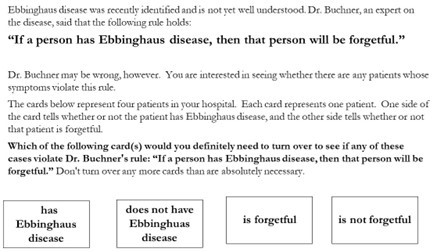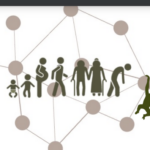
Social exchange is cooperation for mutual benefit. It is an “I’ll scratch your back if you scratch mine” principle: X provides a benefit to Y conditional on Y doing something that X wants. Do we have reasoning mechanisms specialized for these interactions?
See papers below. And here for a review of the evidence
[This page focuses on reasoning. For research on motivations regulating reciprocity, responses to cheating, and reciprocity/sharing in small-scale societies, click here. ]
Social exchange: Universal in humans, but rare across species
Social exchange (also called reciprocity, reciprocal altruism, and dyadic cooperation) is universal in our species. We take this basic human activity for granted, but it is zoologically rare—and, when it is found, the two parties are usually reciprocating the same thing (as when two primates groom one another). By contrast, we exchange a wide array of favors, goods, and services—you might babysit my children this afternoon and, sometime later, I might make a special dinner for you and your family.
Not only do we routinely engage in social exchange, but it is highly elaborated in all human cultures, occuring in many forms: reciprocal gift giving, trade, giving and receiving favors—sometimes we implicitly understand we have reciprocal commitments, sometimes there is an explicit agreement to exchange favors, goods, or services.
What cognitive machinery makes these kinds of agreements and relationships so easy to understand? Do we have cognitive mechanisms specialized for reasoning about social exchange—with a subroutine designed for detecting cheaters? [Reviews of the evidence: 2015, 2008]
Content-free versus content-rich reasoning mechanisms
Blank-slate theories of human intelligence propose that reasoning is carried out by content-free operations: ones that can be applied uniformly across domains, because their procedures have no content that would support reasoning in one domain but not another. The inferences of first order logic are content-free: If I tell you “If P happens then Q happens”, and then tell you that P happened, you can validly infer that Q happened. P and Q could refer to any subject matter.
Content-rich reasoning systems have proprietary concepts (what philosophers used to call “innate ideas) and specialized inference procedures that supercharge reasoning in one domain but are useless in another. Theory of mind reasoning is a well-known example: We assume that behavior is caused by a person’s beliefs and desires, but these concepts are useless for predicting the behavior of rocks or clouds.
An evolutionary approach implies a radically different model of human intelligence. The mind surely does have some reasoning systems that are relatively content free–see the page on Judgment Under Uncertainty for some examples. But flexible, intelligent behavior requires a number of content-rich systems as well, because solving different problems often requires qualitatively different computations. The task demands of different adaptive problems select for functionally specialized problem-solving strategies, unleashing massive increases in problem-solving power for ancestrally recurrent adaptive problems.

Flexibly intelligent: an analogy. A smart phone is, well, smart because it has many specialized apps, each well-designed to solve a different problem (navigation, translation, playing games, checking in to airlines…). If it had fewer apps, it would solve fewer problems.
Task analyses of ancestral adaptive problems are the key to discovering new mechanisms in the human mind. The vision scientist, David Marr, called this a theory of the computation: It specifies what adaptive information processing problem your research is addressing, and asks what features a computational system—what representations and algorithms—would be able to solve that problem well.
Early on, we did a task analysis asking what properties a computational system that is well-designed for reasoning about social exchange should have (1985, Chapter 5; 1989). Inferences necessary for engaging in social exchange do not correspond to inferehce rules of first order logic (or domain-general deontic logics). And, because social exchange can evolve only if cooperators can detect cheaters, we hypothesized that algorithms specialized for reasoning about social exchange would include a subroutine that is well-designed for detecting cheaters.
This guided our 20 year program of research on reasoning about social exchange. Our experiments looked for—and found—design features that a cognitive adaptation specialized for reasoning about social exchange should have. These experiments were also designed to test against alternative hypothesis; taken together, the body of results rules out every alternative hypothesis we know of.
Conditional reasoning and the Wason selection task
Whether an agreement is explicit or understood implicitly, benefits are delivered conditionally in social exchange (reciprocation): conditional on the other party doing what you required in return. Understanding it requires conditional reasoning of some kind. So conditional reasoning can be a test case:
Is the cognitive machinery that causes good conditional reasoning content-free—does it operate well regardless of content? (a blank slate-type theory) or
Do our minds include cognitive machinery that is specialized for reasoning about social exchange? ( alongside other domain-specific mechanisms, each specialized for reasoning about a different adaptive domain involving conditional behavior).

When asked to look for violations of conditional rules, people do poorly. But when the rule involves social exchange, and detecting violations corresponds to looking for cheaters, they do very well.
Most of our studies used a well-known test of conditional reasoning, the Wason selection task. It presents a conditional rule, four cases (represented by cards) that might violate that rule (or not!), and asks you which cases you would need to know more about to see if any of them violate the rule. Here is a short powerpoint file that shows you the Wason task (it helps to try it yourself!)—it will be easier to see if you look at the file in display mode.
The Wason task lets you hold many task demands constant, while changing what the conditional rule is about: social exchange, precautions, permission rules in general, etc. You can also hold constant the social exchange rule, and vary properties of the potential rule-violaters.
Detecting cheaters. Whereas people perform poorly when they are asked to detect violations of most conditional rules (25% correct of less), we predicted and found a dramatic spike in performance when the rule specifies an exchange and violations correspond to cheating (65-85% correct).
Alternative hypotheses argue that people’s uncanny accuracy at detecting violations of social exchange rules does not reflect a cheater detection mechanism, but extends instead to all rules regulating when actions are permitted (deontic conditionals). This is not true: We have done many experiments demonstrating that deontic rules as a class do not elicit the search for violations.
These studies show that reasoning about social exchange dissociates, both functionally and neurally [2002; 2006] from reasoning about content that taps other domains (including precautionary rules, which are so similar to social contracts that most theories do not distinguish them). The social exchange system represents agreements to exchange using content-rich proprietary concepts (e.g., agent(i), benefit to agent(i), requirement of agent(j), obligation, entitlement, cheater). Its procedures operate on these representations, producing inferences appropriate to social exchange that are not licensed by content-free logics (deontic or otherwise). A common misunderstanding is that social exchange content activates logical reasoning. It does not. The reasoning system activated by social exchange attends to information that would reveal cheaters, whether the resulting answer is logically correct or not. [1989; 1992; 2000]
These studies show that the cheater detection system functions with pinpoint accuracy, searching for violations of social exchange rules only when these are likely to reveal the presence of someone who intends to cheat. It does not search for violations of social exchange rules when these are accidental, when they do not benefit the violator, or when the situation would make cheating difficult. The design features of this content-rich system are precisely tailored for their adaptive function.
For more background, click here.
A roadmap to the relevant papers:
For the state of the evidence regarding cognitive adaptations for reasoning about social exchange, see:
Cosmides, L. & Tooby, J. (2015). Adaptations for reasoning about social exchange. In Buss, D. M. (Ed.), The Handbook of Evolutionary Psychology, Second edition. Volume 2: Integrations. (pp. 625-668). Hoboken, NJ: John Wiley & Sons.*
The 2015 paper includes developmental evidence, and more about the ancestral context.
If your interest leans toward how reasoning about social exchange differs from first order logic or deontic logic, read our 2008 paper, with its replies to Fodor and Mallon, in Walter Sinnott-Amstrong’s edited volume, Moral Psychology. The evolution of morality: Adaptations and innateness, vol. 1 (MIT Press)
Cosmides, L. & Tooby, J. (2008). Can a general deontic logic capture the facts of human moral reasoning? How the mind interprets social exchange rules and detects cheaters. In Moral Psychology, pp. 53–119
Cosmides, L. & Tooby, J. (2008) When falsification strikes: Reply to Fodor. In Moral Psychology, pp. 143-164.
Cosmides, L. & Tooby, J. (2008.) Can evolutionary psychology assist logicians? Reply to Mallon. In Moral Psychology, pp. 131-136
Want something briefer? See:
Cosmides, L., Barrett, H.C., & Tooby, J. (2010). Adaptive specializations, social exchange, and the evolution of human intelligence. Proceedings of the National Academy of Sciences, 107pp. 9007-9014.
This 2010 paper shows that social exchange activates an information search procedure that looks for cheaters, not merely for violations of social exchange rules, such as innocent mistakes.
It also shows how violation detection collapses when a deontic rule lacks elements necessary to interpret it as involving social exchange (such as a benefit to the potential violator)
Also brief: Our 2002 companion papers in PNAS. See:
Stone, V., Cosmides, L., Tooby, J., Kroll, N. & Knight, R. (2002). Selective Impairment of Reasoning About Social Exchange in a Patient with Bilateral Limbic System Damage. Proceedings of the National Academy of Sciences, 99(17), 11531-11536.
Sugiyama, L., Tooby, J. & Cosmides, L. (2002). Cross-cultural evidence of cognitive adaptations for social exchange among the Shiwiar of Ecuadorian Amazonia. Proceedings of the National Academy of Sciences, 99(17), 11537-11542.
For more background–in general, and specifically on the significance of the 2002 papers, click here.
Legacy papers—thorough but not brief (!)
Cosmides, L. & Tooby, J. (1992). Cognitive adaptations for social exchange. In J. Barkow, L. Cosmides, & J. Tooby (Eds.), The adapted mind: Evolutionary psychology and the generation of culture. pp. 163–228. New York: Oxford University Press.
This chapter discusses the selection pressures, cognitive evidence, and how cognitive adaptations for social exchange shape human cultural life.
Cosmides, L. (1989). The logic of social exchange: Has natural selection shaped how humans reason? Studies with the Wason selection task. Cognition, 31, 187-276.
This paper presents some of the initial experiments from Cosmides, 1985, plus five additional early experiments discriminating between social contract theory and Cheng & Holyoak’s permission schema theory. See also C&T 1992 and our paper above in PNAS 2010.
Cosmides, L. & Tooby, J. (1989). Evolutionary psychology and the generation of culture, Part II. Case study: A computational theory of social exchange. Ethology & Sociobiology, 10, 51-97.
This, and the dissertation, have the computational theory that guided our experiments. It is also in C&T 2008.
Fiddick, L., Cosmides, L., & Tooby, J. (2000). No interpretation without representation: The role of domain-specific representations and inferences in the Wason selection task. Cognition, 77, 1-79.
On relevance theory, as proposed by Sperber, Cara, & Girotto. We explain why domain-general versions of relevance theory do not explain reasoning about social exchange or precautionary rules. Shows dissociations between precautionary and social exchange reasoning.
This work began with Cosmides’ 1985 dissertation:
Cosmides, L. (1985). Deduction or Darwinian Algorithms? An explanation of the “elusive” content effect on the Wason selection task. Doctoral dissertation, Harvard University. University Microfilms #86-02206.
Other work:
Cosmides, L. & Tooby, J. (2005). Social exchange: The evolutionary design of a neurocognitive system. In The New Cognitive Neurosciences, III (Michael S. Gazzaniga, Ed.). Cambridge, MA: MIT press.
A short review of the evidence, aimed at cognitive neuroscientists
Fiddick, L. (2004). Domains of deontic reasoning: Resolving the discrepancy between the cognitive and moral reasoning literatures. Quarterly Journal of Experimental Psychology 57(3), 447-474. click here
Functional dissociations, in both moral reasoning and violation detection, between deontic rules involving social exchange and precautionary rules
Stone, V., Cosmides, L., Tooby, J., Kroll, N. & Knight, R. (2002). Selective Impairment of Reasoning About Social Exchange in a Patient with Bilateral Limbic System Damage. Proceedings of the National Academy of Sciences, 99(17), 11531-11536.
A very narrow neural dissociation between two types of deontic permission rules, both of which involve subjective utilities: ability to detect violators of rules involving hazards and precautions was spared; ability to detect violators of social exchange rules (i.e. cheaters) was impaired.
Sugiyama, L., Tooby, J. & Cosmides, L. (2002). Cross-cultural evidence of cognitive adaptations for social exchange among the Shiwiar of Ecuadorian Amazonia. Proceedings of the National Academy of Sciences, 99(17), 11537-11542.
Cheater detection–necessary for social exchange to be an evolutionarily stable strategy (ESS) —is buffered against cross-cultural variation. a cultural dissociation between ESS-relevant and ESS-irrelevant aspects of the adaptation.
Cosmides, L. & Tooby, J. (1997). Dissecting the computational architecture of social inference mechanisms. In: Characterizing human psychological adaptations (Ciba Foundation Symposium #208). Chichester: Wiley. (pp. 132-156).
What empirical criteria allow one to tell whether reasoning is about two domains is governed by a single underlying mechanism, or by two separate ones? Illustrated by discussion of Cheng & Holyoak’s permission schema theory versus social contract algorithms
Tooby, J. & Cosmides, L. (1996). Friendship and the Banker’s Paradox: Other pathways to the evolution of adaptations for altruism. In W. G. Runciman, J. Maynard Smith, & R. I. M. Dunbar (Eds.), Evolution of Social Behaviour Patterns in Primates and Man. Proceedings of the British Academy, 88, 119-143.
Theoretical article contrasting social exchange with deep engagement relationships: presents an alternative set of selection pressures that should have designed the computational systems that give rise to deep engagement relationships: true friendships, romantic love; certain familial loyalties
Cosmides, L. & Tooby, J. (1994). Better than rational: Evolutionary psychology and the invisible hand. American Economic Review (May), 327-332.
How evolved computational specializations shape “the rules of the game”; relation between cognitive adaptations for social exchange and modern trade is one example
Cosmides, L. & Tooby, J. (1994). Beyond intuition and instinct blindness: The case for an evolutionarily rigorous cognitive science. Cognition, 50, 41-77.
Grammars of the social world; grammar of social exchange
Cosmides, L. & Tooby, J. (1991). Reasoning and natural selection. Encyclopedia of Human Biology, vol. 6. San Diego: Academic Press.
See also:
Gigerenzer, G., & Hug, K. (1992). Domain specific reasoning: Social contracts, cheating, and perspective change. Cognition, 43, 127-171.
Platt, R., and Griggs, R. (1993). Darwinian algorithms and the Wason selection task: a factorial analysis of social contract selection task problems. Cognition, 48: 163-192.
*For those curious about Buller’s critique in Adapting Minds, our 2015 paper reviews all the relevant evidence. Buller neglected to discuss widely-known evidence that disconfirms his view. In particular, his counter-explanation, like Fodor’s, requires that all deontic rules elicit good violation detection. But that is not true–a fact that has been known since the early 1990s (and before). So see the sections on “dissociations within the domain of deontic rules”. See also CT 2008, and especially our reply to Fodor.







